Fiume is one of the projects of Croatian producer/DJ Jasmin Mahmić. We have been following his releases as Le Chocolat Noir and his records are usually played in the sets of our DJ resident Lamari. With this new AKA, focused on his more experimental side, he has recorded three releases, the last one Fiume II among the most interesting albums of this 2022. It’s going to be another of the highlights of the Sunday at Ombra, a day that we won’t forget easily.
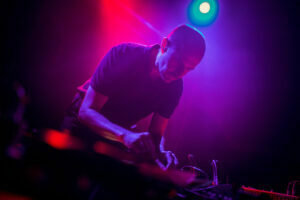 —How was growing up in Yugoslavia? I guess you lived all the war during your childhood. Was it difficult to get records?
—How was growing up in Yugoslavia? I guess you lived all the war during your childhood. Was it difficult to get records?
—Growing up in Yugoslavia was, from today’s perspective, an interesting experience. I was a child in those years so did not understand the complete political and social context then. Now it feels as an added value when I am able to comprehend what it was in practise, having this experience of living in a different system. In the last two decades, I visited some countries that are still under different forms of dictatorship and some situations revived the childhood memories of the system back then.
I was a teenager during the war in the first half of 90s, when Croatia declared independence. Well, Yugoslavia was not a classic east block communist country. Several Yugoslav labels were legally publishing the music released in the west. There was a small but I can say crazy electronic scene in 80s, ranging from experimental to pop. When it comes to underground electronic music from 80s and from early 90s, I guess DJs had to go abroad to buy those records. Some releases were available in a store in Zagreb in the early 90s too, but it mostly sold CDs. Being a kid, for me it was all about tapes and some CDs and I think my pocket money was not sufficient to buy vinyl from abroad. Vinyl obsession started a bit later in the 90s.
—When and how did you discover industrial music? I have seen in your mixes that you are a big fan of Throbbing Gristle and Coil. How did you get into them?
—My first encounters with TG and Coil were primarily through my older EBM/Goth friends from my hometown, in my teen years. Some of them were burning CDs and making tapes for me and through their selection I got into EBM too. I was already into electronic dance music; this however dragged me more into the obscure and dark music.
There was also a radio programme on the Croatian Radio 3 on late Saturday evenings by Zagreb’s Dinko Bažadona, who played all different obscure electronic music. He was the one who brought, among the others, PTV and DiJ to Zagreb and was friend with different artists from this scene.
—Someone told me that there was a really wild techno scene in Zagreb in the 90s. What can you tell us about this?
—That scene was already starting to become alive and crazy in the 80s, with several DJs spinning EBM and there were those who were playing hip hop, electro and italo too. In parallel, some of them started playing techno and house and combining it with EBM. I was going out to those parties usually taking place on Wednesdays and Thursdays, Sundays too. Those who were there knew what they came for, lots of people dressed in black leather and plastic, gays mixed with freaks who were into techno and EBM, the vibe where nobody cared or minded who you/we are. It was just about getting lost in the smoke and strobe lights and dance to music. Only after the first big rave in a tunnel under the old town of Zagreb in 1993, big raves became more frequent and clubs started having techno parties on weekdays, slowly turning the whole scene into, as I like to call it, a Saturday night disco with harder music. Those early parties on weekdays formed my vision of clubbing, basically lots of strobe lights and dark clubs with banging music. I was not much fond, generally, of parties towards the end of 90s, the music played at those was mostly too boring for me and only into the millennium things changed for better. The above mentioned Bažadona continued doing Bizarre events throughout the 90s, those were also musically the most interesting for me, keeping the vibe of the early 90s events with different music styles being played.
—When did you start DJing? Who inspired you to do it? Fragmenti was your first residency, what kind of music were you playing back then? Electro?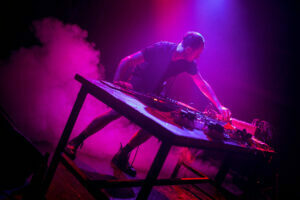
—My first club events were in 2000, in a local club in the hometown of Sisak, with several friends and local DJs/producers/music lovers. I played any records I had, so some Chicago and rave stuff, also some electro. The first gig outside my hometown was in 2003 at KSET in Zagreb, where I played electro and electroclash, some wave too, I guess.
—With Saša Rajković you created Soba 23 and Electro City. What do you remember of those days?
—Saša was producing as Zarkoff then and since not many DJs were playing what we liked in those years, we started doing these two events, Soba 23 in Zagreb and the latter in Sisak, our hometown. Well, I remember meeting some awesome clubbers back then, some of which are still good friends and we still find ourselves together on dance floors, while some others I meet at the grocery markets buying veggies haha.
Some of these events were just super crazy and bizarre and we had lots of fun. Our first foreign booking was Sendex who came over with two suitcases of gear, the event took place in a small and now legendary venue called Točkica. Then, when we brought Legowelt to Zagreb for the first time in 2007, that was the only time we did not lose money, certainly something to remember. We also had Catnip live! I remember that some performances could have been inspired by TG and similar, sometimes I was worried if all would end up fine and was hoping that nobody would get hurt from whatever we were doing!
—I guess that meeting Saša Rajković was quite important as you have been working together in a few projects. He is also going to play at Ombra as Zarkoff and with Sumerian Fleet. What can you tell us about him? I don’t think we will have enough time to interview him too.
—Zarkoff is the one who got me into music production, and I learned so much about technical processes from our joint work in the studio. So, in a way I could say that I am not sure when and how I would start making my own music had Saša not asked me to start doing stuff together as FFFC. I am looking forward to seeing Sumerian Fleet for the first time. About his solo performances, I am not sure if there is anybody who has seen him playing live more than me. I can see that he is busy with his mastering work in his Sensorium studio in Zagreb but also produces and releases music, the latest one if not mistaken is a vinyl EP on Tripalium Records that I tend to play at events, check it out.
—That takes us to the following question, when did you start Florence Foster Fan Club? Why did you choose the name of that infamous opera singer?
—We formed FFFC in 2004 or 2005, maybe 2003. Our first release was only in 2009, we however often played live during the years before our first album came out. Well, I think that her story is fascinating and crazy, very comical and sad too, so certainly a person that we found very interesting for what and how she did it. Inheriting lots of money and spent it doing what she loved and wanted to do, who wouldn’t like to be FF Jankins!
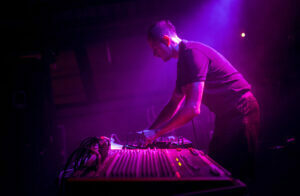 —With that project and the following one, Le Chocolat Noir, you have been linked to the EBM scene. What do you find interesting in this style? Why do you think this is still relevant today?
—With that project and the following one, Le Chocolat Noir, you have been linked to the EBM scene. What do you find interesting in this style? Why do you think this is still relevant today?
—EBM is simply fantastic club music, the name says it all. It can be played along electro, Chicago house and techno, and wave, of course, disco and experimental music. It is also linked to some of my first clubbing experiences. It is relevant as a genre since artists can tackle different issues through their lyrics, something you don’t have to such a degree in techno for example.
Unfortunately, just like any genre there is not enough personality in what some artists are producing, there is too much repetition and sometimes songs/tracks sound uninspiring when you hear them. For me, and this goes for any genre, many artists keep producing tracks that are too similar, well produced for sure. Still EMB is much more that that recycled arpeggio bassline. Also, not all male vocals in EBM need to sound alike, like dark and scary, or similar, while there is a tendency among artists to do exactly that. Turns too much cliché. It needs more experimenting.
—Your first release on your own, was Le Chocolat Noir’s Who We Are, right? What were your intentions back in the day when you started the project? I guess that you also released some tracks before, right?
—Home Made Electronica, a label from Zagreb, released it and that was my very first release. I was talking about my clubbing experiences and identity and personal issues in those first tracks, and I realised that I could talk about anything that either makes pleasure or displeasure to me and also that can have my ideas shared through my lyrics. Producing music was also like a therapy for me, an opposite to some serious issues I was dealing with in my professional life.
—The music of LCN has changed a lot during these years and included a lot of styles. You define this as “inconsistency”. Do you think that a bit of more open-mindedness is necessary in today’s electronic scene?
—Since I am into different genres of electronic music, I never wanted to limit myself in terms of styles. Therefore, the mentioned “inconsistency”.
I would not talk about the festival level scene, since that is different matter. I think that in the club scene there is quite some open-mindedness since there are artists who are “inconsistent”. Independent labels release music from various artists and there is very interesting mixing of scenes and artists from techno, electro, EBM and darker styles backgrounds there. Even many goths are more open towards techno-ish sound nowadays haha, still there are some very very dark goths who still resist, unfortunately. I have a track about that saying “ta purete me derange”, the same goes for clubbers who are, for example, into techno and who like darker music but cannot handle vocals. I am not saying that everyone should be into everything, I am just taking a piss out of any hc purists. Summing it up, the artist/labels scene is quite open-minded, the audience still needs to follow. This is also due to promoters and event organisers not pushing it enough.
—Honored Matres was your second AKA. Did you want to release music that did not fit the LCN moniker or was it just a way to release more material?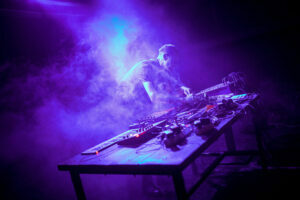
—Yes, I was initially aiming to produce something with less vocals and more classic-ish techno and acid tracks. There were several tracks released after I started producing under that name. After a hiatus this alias is again alive, several tracks have been released on VA compilations last and this year, and at least another one is coming in 2023. I am not sure what I want to do under this name at present. I am thinking of a queer character, probably a naughty one since it can be interlinked with characteristics of Honored Matres, a fictional character appearing in fifth and sixth book of the Dune. “They are described as an aggressive cult obsessed with power, violence and sexual domination.”
—What can you please tell us about Lab Personnel? Was it a dream team/group of friends of Croatian producers?
—Zarkoff initiated this project through Synth Lab gatherings in our hometown of Sisak, at which we also recorded our FFFC EP on Gooiland Elektro label, as well as his EP on Return To Disorder, where he made tracks with few of us.
Synth Lab turned into Lab Personnel, included up to eight artists, so we are numerous and not every jam session had the same artists present. I was not present at the final one since was outside Croatia with work. The concept was to record whole sessions and then we selected parts of the recorded material and produced tracks. So far, we had one vinyl LP released on Medical Records and two self-released cassettes on Lab Personel label. We did not have those jam sessions since just before Covid, and there is no initiative at present to have one organised. This can easily change of course.
—Why did you create this new AKA Fiume? And why did you choose Fiume as a name?
—Fiume was born with me starting using Moog DFAM. This machine gave me a completely different approach in terms how I produce music and it sounded very different to anything I produced before. After Guy from Bunker wanted to have it released, we talked a lot about different things, including futurism. Since I lived in Rijeka town at the time (Fiume in Italian), and the release on Panzerkreuz also coincided with the anniversary of 100 years of the notorious or controversial Free State of Fiume, which is in a certain way linked with futurism, we thought that this name would fit nicely with this new alias.
—Fiume is your more experimental/industrial side. What is easier or more difficult for you, to create an EBM track or a more experimental one?
—Both are fairly easy, when I have an idea what I want to do. I play with sounds and ideas in my studio, no matter the alias or genre, and then it can go different directions. Sometimes I have a topic or lyrics made beforehand and from that I start working on a new song or track. With EBM and wave stuff, the process is probably less adventurous but still challenging since I tend for more structured songs, while with the second it’s more entertaining for me and it lets my mind work more openly.
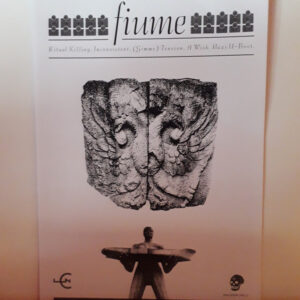 —In the interview we had with Max Durante, we spoke about futurism. You have written that “Fiume lives futurism and futurism is now”. How has this artistic movement influenced your music?
—In the interview we had with Max Durante, we spoke about futurism. You have written that “Fiume lives futurism and futurism is now”. How has this artistic movement influenced your music?
—I like the social contexts when I work on something. Guy introduced futurism to Fiume, as I mentioned earlier. Observed from present times, to me the original movement from the early 20th century sounds like another concept that is naïve and utopian, still very much needed and very human. We always talk about progress and that “tomorrow will be better”, we live through hope even knowing that things simply go wrong or in unexpected ways in the end. People forget to live in the present and everyone is aiming for the future, towards what will come. In today’s context, futurism has much broader concept from its origins and this is something that attracts me more than the original movement of futurism. I like the present time context of futurism and I would like to see what it means to different people or groups of people. Further, I am thinking about how it could develop in the years or decades to come. My very first initial thoughts about how I see futurism today should be published soon in a local fanzine.
So, to sum it up, the actual movement did not influence the production process of the very first Fiume, still, after revisiting it, it makes sense to connect it with Fiume. Later, its ideas were introduced in the concept and it gives additional layer to the thoughts I am writing about in my lyrics.
—As your said before, your first released was recorded with a Moog DFAM and a Dave Smith Prophet 12. Have you kept this gear in the rest of your releases?
—DFAM is reserved strictly for Fiume. All the other gear, including some DSI synths, Korg and Nord synths too, as well as small Technosaurus and Moog Mother 32, are being used for all my aliases. I don’t have a huge studio, but it is quite versatile. For Fiume I am also using a guitar, Hohner g3t, the model used by Cosey Fanni Tutti. Since the guitar idea is inspired with the sound of TG, my first thought was that I want a guitar that is played by CFT. It’s a headless guitar, so I am keeping that anti r’n’r attitude that characterised TG.
—The music was described as a mix of Suicide with raw techno. How has Suicide influenced your work?
—Zarkoff told me long time ago that my vocals in track “Liberation” by Honored Matres reminded him of Alan Vega (Saša probably does not remember this), not the vox colour I guess but more the processing of the vocals that I did. I never thought of it while recording it, it was unintentional. Remembering this, when I started working on first Fiume‘s songs, I brought in the ideas inspired by Suicide‘s music.
—You said that with this project you wanted to tell bizarre stories and talk about strange trips in dark places of the world. I guess that your second release, entitled Haiti could be the best example of this. Did you want to keep a thematic line in the project?
—Those places are not always dark, they might have some dark context linked to their history or current social, economic and/or political situation, but these countries are generally heaven on earth, being mostly in tropical parts of the world. One of the main thematic lines of Fiume is based on those experiences, often mystical and magical, ritualistic. Traditional believes are inspirational.
—This EP, Haiti was based on your time spent there, right? What did you try to achieve with this?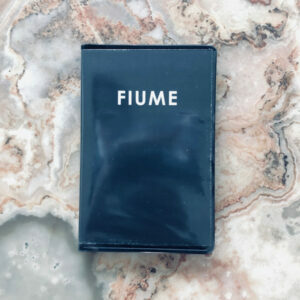
—I spent four months in Haiti, mostly in rural areas. Everything that I experienced there hit me really hard in different ways and opened my mind more than any other experience in general.
The label approached me with concept of the release, which I liked straight away as was already using some of my stories from Haiti in the first Fiume vinyl. I have an awesome book on Haitian Voodoo that helped me with further ideas. I am not sure if you have seen it, but there is a video for one of the tracks from this EP made by a friend of mine, using video footage recorded at a voodoo ceremony and an animal sacrifice ritual at a village in Haiti.
(link: https://www.youtube.com/watch?v=cDmbuGfFhWo)
—This year you have released, Fiume II. According to you, how has the music of the project evolved in these years since your first EP?
—Fiume II on L.I.E.S. involved slightly different approach in the way how I worked on these songs in the studio. I included additional drums, while in the first Fiume almost all drums were from DFAM, with the exception of some percussions. The rest stayed mostly the same. Only now, while working on new Fiume tracks, I am having a slightly different concept in mind, aiming for two directions. One is towards club friendly but still raw sound, something I am already doing in the live shows. The second is a more experimental sound. Some new songs melt Suicide and TG influences, with additional ideas I have. The idea is not to copy the exact sound by artists that have influenced me, it’s more about playing with it and combining different ideas. I also think about Esplendor Geométrico, Unit Moebius (Anonymous) and Group A and their output when I work on Fiume.
—Your last work has been an EP with Christina Kroupa. What can you please tell us of this collaboration?
—We are now joking that this was not meant to be a dark project. We did not succeed with that, still we are very happy with what we are doing. Our first release on KRI was very well received, we have one song on Osare! Editions that is coming out this month and another VA cassette by Marguerite Records will follow, as well as our second vinyl EP on a very nice label, so stay tuned for more news. I should mention that we will from now on be releasing under the alias Black Dot.
For me, it is a very exciting collab since Christian and I, in addition to music, share many ideas about societies and occurrences in the World. Musically, I am very much into what he produces with his synthesizers and rhythm machines and I am happy to perform as vocalist. It gives me new persona too, liberated from standing behind the machines. No stage diving yet but let’s see what the future will bring.
—You have released an EP on Frigio records and collaborated on a couple of their Frigio All Stars compilations with your different AKAs. And you have played in some of his events. How did you start the relation with the Spanish label?
—After discovering the label, I sent some demos to Juan Pablo and he liked them. This was in the time when not many supported my musical output. The above-mentioned track “Liberation” was the first that came out. Sneaker, who is performing at Ombra too, and who is releasing on Frigio and is/was involved with the label also told me he liked that track a lot. JP and I became friends quickly after that and we continue having this friends and artist/label relationship ever since, so there will be another Honored Matres track out fairly soon on another VA compilation, then we will see, maybe more stuff will follow.
—Disco Panonia is your platform for self-releases, your radio show and the name for your events. How would you describe the spirit behind all of this?
—This is my mess and it goes pretty well. Anything I like I throw in, no specific concept but that non-purist approach.
—The most famous festival in Croatia is Dimensions and you have been playing there. How was the experience? I have been tempted a few times to going to the festival but it’s quite expensive. It looks like a festival for rich English people.
—Ha,ha well, all the foreign festivals in the Croatian coast are expensive for locals and not only locals. There are reduced price tickets for the ex-Yu zone, but still people going to those festivals are predominantly foreigners. I went to Dimensions the year Model 500 were playing, I bought ticket for that one. After that, I played two times and heard some great sets and some disappointing ones, I think DJs tend to adjust to the festival audience and festival concept, this is not linked specifically to this festival but to all of them. Generally, I prefer festivals with more live acts of different genres. The one I liked a lot was Grauzone in the Hague in 2020, just before Covid.
As a performer, the experience depends a lot on which stage you will be playing at and about the time slot. In that context, for me the best experience was playing at this year’s Dekmentel Selectors together with my bRave crew from Zagreb.
—What can we expect in the future of Fiume or/and Le Chocolat Noir?
—Hopefully there will be more live/DJ gigs and bookings, something that is not easy to have organised. Also, more releases are being worked on, more collabs too (keep an eye on Involucija project), some coming your way already next year. More conceptual music output is planned and more queerness will be delivered through some of the aliases.
—How is going to be your live at Ombra Festival?
—It will combine all three releases as well as some unreleased songs in my performance. Every Fiume live is different since many situations happen spontaneously within the structure I have imagined, there is some chaos involved. Imagine it as a ritual, listen to the stories I tell in different languages and fingers crossed that there will be tremendously mega level of strobe lights during my performance to help me put you even further in a trance.



